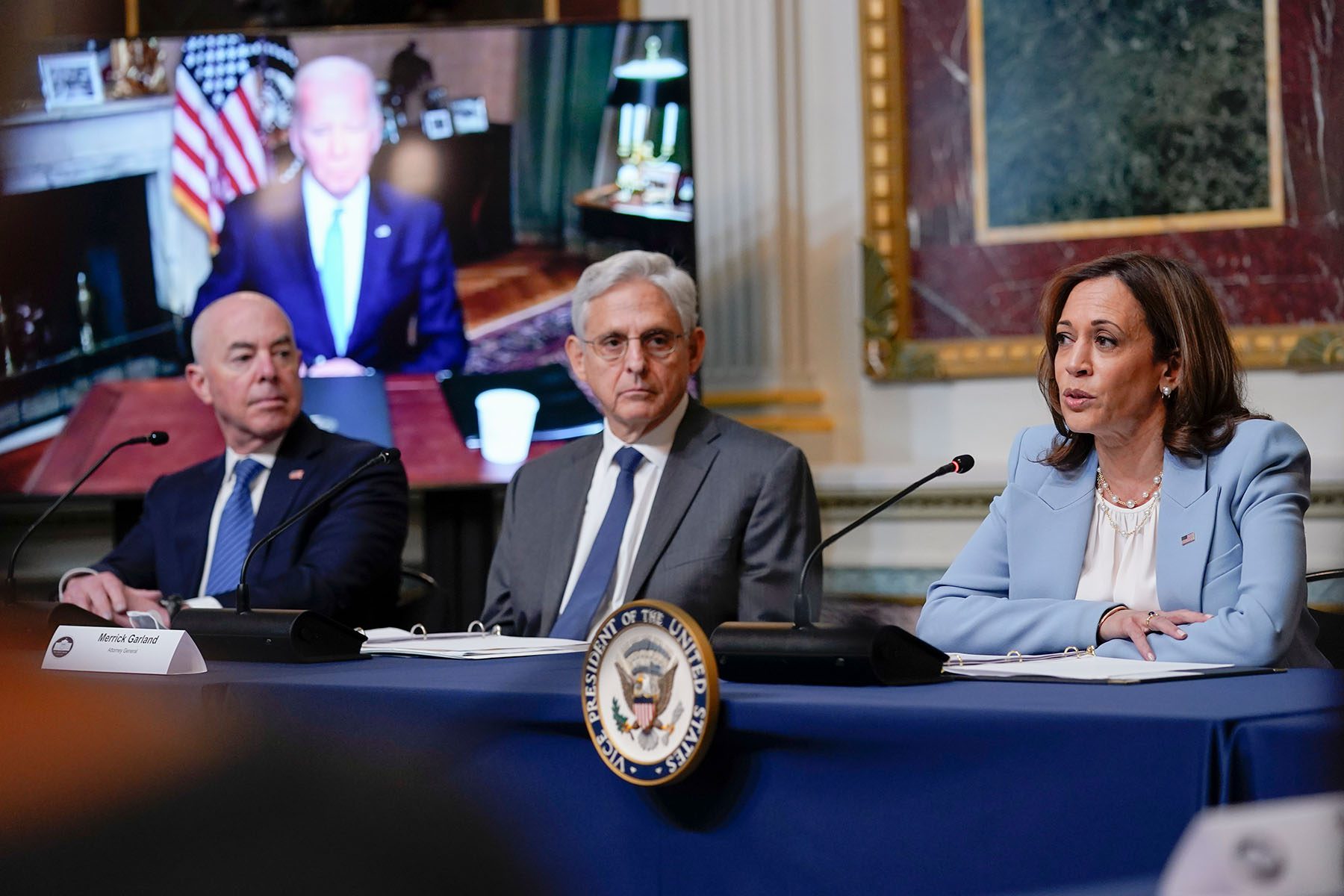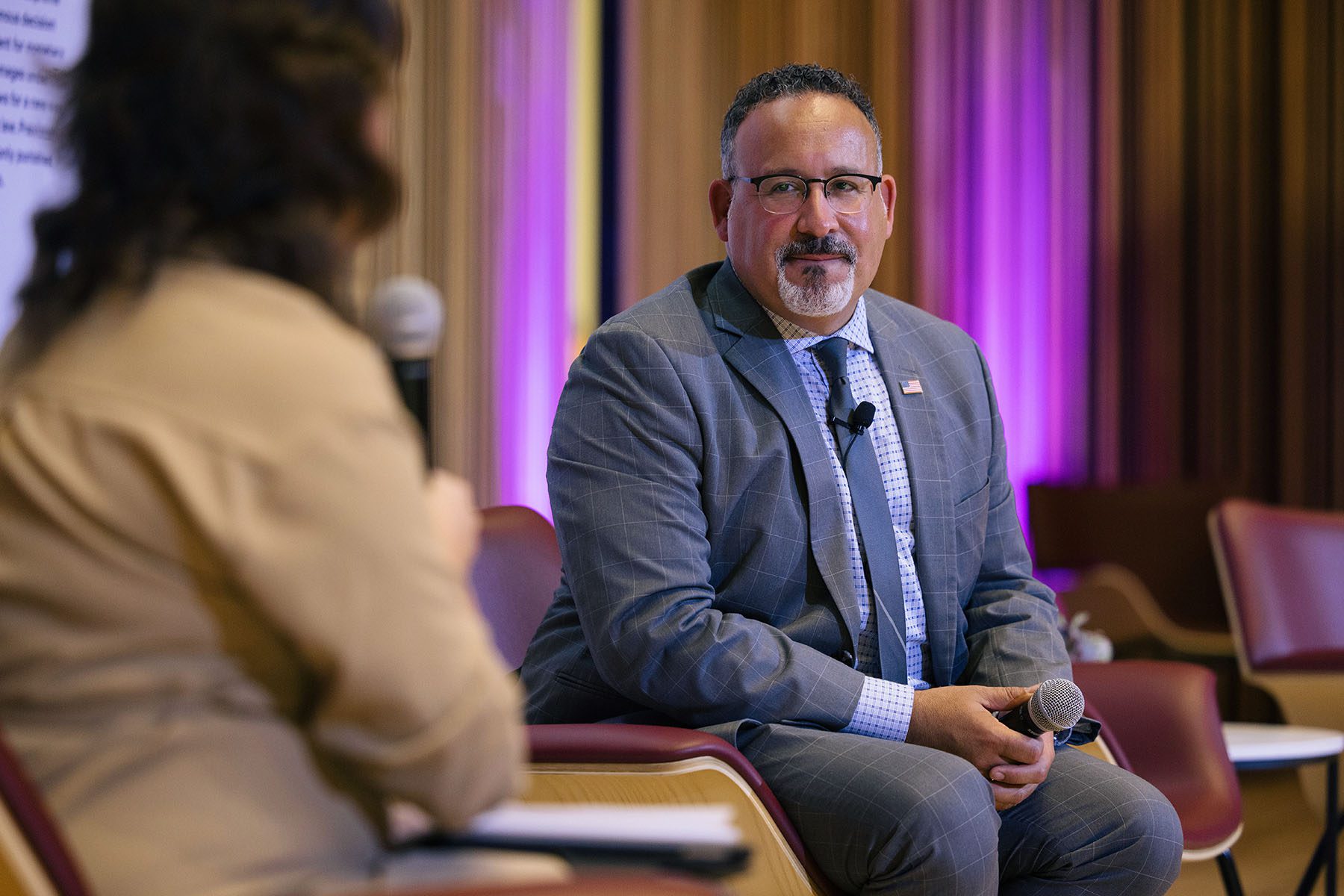The Biden-Harris administration issued fresh guidance Tuesday reinforcing the legal protections for pregnancy and abortion under Title IX as it recognizes the 100-day milestone since the Supreme Court overturned Roe v. Wade.
The guidance for higher education institutions from the Department of Education, shared first with The 19th, reiterates the legal protections against discrimination against pregnancy — or the termination of a pregnancy — under Title IX. The fact sheet released by the department also reminds universities that they must treat pregnancy, childbirth and abortion “the same as any temporary disability” under the health insurance plans they offer to students and faculty.
President Joe Biden and Vice President Kamala Harris led a second meeting of the Task Force on Reproductive Healthcare Access on Tuesday afternoon. In public remarks before the roundtable met privately, they reaffirmed their commitment to defending abortion rights and urged Americans to vote in November, saying it was necessary to allow Democrats to pass a federal law to protect abortion access.
“It is important for everyone to know what is at stake,” Harris said. “To stop and reverse these attacks on women, we need to pass a national law. And so we need the American people to make their voices heard and take a stand on the rights of all women to exercise their choice to have access to reproductive health care.”
Education Secretary Miguel Cardona told the roundtable that he is “worried” over what he sees as “the chilling effect” of the ruling.
“It’s clear: The Dobbs ruling has sown fear, confusion and distrust on our college campuses,” Cardona said, adding that his department is “fully committed” to enforcing the protections of Title IX.
“Today, I want to be clear with college leaders in America: Access to contraception should not be in question,” Cardona continued. “Access to health care, including reproductive health care, is critical to the well-being and success of our nation’s students.”
Biden and Harris also singled out the University of Idaho for its new policy of no longer providing birth control to students. Lawyers at the university advised the school not to give students contraceptive health care, citing the state’s strict ban on abortion and additional legal penalties for state employees who refer students for abortion care, The Washington Post reported.
“My message to any other colleges considering enacting policies like this: Don’t. Please don’t,” Biden said at the Tuesday roundtable. “We’re not going to sit by and let colleges throughout the country enact extreme policies.”
The guidance comes as the Biden administration continues to grapple with the fallout of the Supreme Court’s decision in Dobbs vs. Jackson Women’s Health Organization in June. A separate memo released Tuesday from Jennifer Klein, head of the White House’s Gender Policy Council, outlines the state of abortion rules and the Biden administration’s efforts to shore up access under federal laws and regulations.
But both memos also underscore the limited tools the Biden administration has to bolster abortion access, as over a dozen Republican-controlled states have banned or severly restricted the procedure since late June.

The White House memo, for example, touts an executive order Biden signed into law two months ago that enabled states to use Medicaid funds to expand access to abortion in states where the procedure remains legal and accessible. But no states have opted into the program, which is aimed at providing care for low-income patients traveling to obtain abortion care, since the executive order’s signing, Politico reported Tuesday, citing “the byzantine, monthslong process of obtaining a Medicaid waiver” as an obstacle.
The Biden administration has also sought to protect access to medication abortion, expanded grants for reproductive health care under Title X, and sued Idaho and Texas for abortion bans it contends violate federal protections to emergency medical care in pregnancy and labor. The Department of Veterans Affairs has also extended abortion care to veterans in cases of rape, incest or threat to the patient’s life, even in states that have banned abortion.
But the administration remains constrained by factors including the Hyde Amendment, which bans federal funds from going toward abortion care in most circumstances.
After the June 24 Dobbs decision, Biden pledged to “do all in my power” to protect abortion rights and has been working across the administration to shore up federal protections in the absence of Roe. Harris has been outspoken on the issue and met with various constituencies to help frame the administration’s message and response, including state attorneys general, faith leaders, health care providers, college presidents, activists and technology experts.

Title IX of the Education Amendments of 1972 broadly prohibits sex- and gender-based discrimination in educational institutions, like colleges and universities, that receive federal funding.
Under Title IX, universities must also offer leave to students for pregnancy, childbirth, abortion care, and recovery from those procedures, and restore students to their previous standing in school after their leave, the memo said. Schools are also required to provide unpaid leave for pregnancy, birth, and abortion care to faculty and staff “for a reasonable period of time,” and similarly reinstate staff to their previous positions after their leave.
The sheet additionally reiterates that Title IX prohibits both harassment and unequal treatment of students in the classroom for pregnancy and “related conditions.”
“For example, a teacher may not refuse to allow a student to submit work after missing a deadline because of absences due to pregnancy or childbirth,” the memo says.






